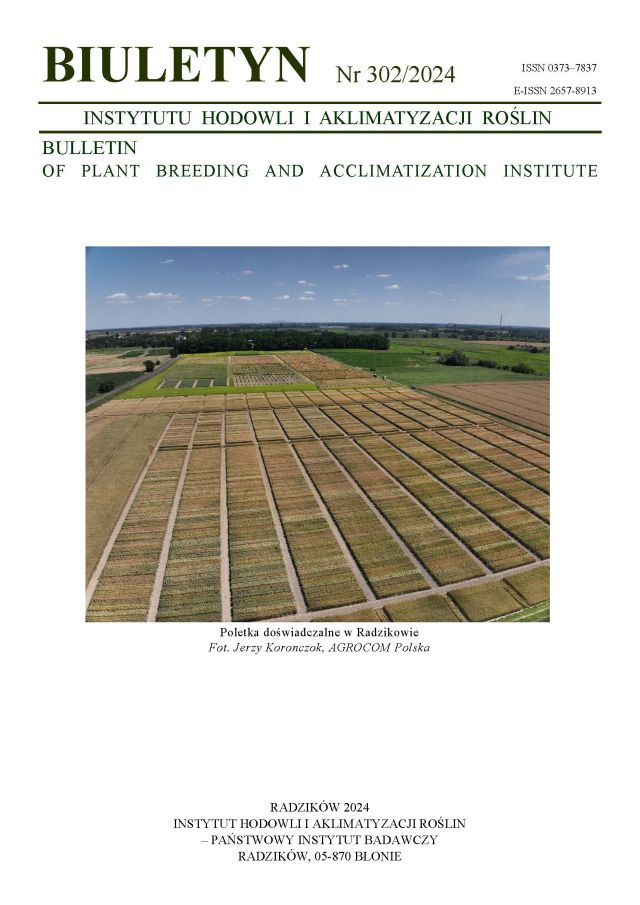The influence of sampling time of fodder galega (Galega orientalis Lam.) on seed yield and the effect of scarification method on seed quality
Józef Sowiński
jozef.sowinski@upwr.edu.plKatedra Szczegółowej Uprawy Roślin, Uniwersytet Przyrodniczy we Wrocławiu (Poland)
Edward Możdżeń
Górska Stacja Wdrożeniowo-Upowszechnieniowa w Paszkowie, 57-320 Polanica Zdrój (Poland)
Abstract
Field experiments were carried out in the Sudety Mountains conditions at the Mountain Station Paszków belonging to Lower Silesian Centre of the Agricultural Advisory in Wrocław at an altitude of 540 m a.s.l. Pod samples were taken every week from the fodder galega field. The sampling began when 50% of pods were fully ripening (brown). A delay in sampling resulted in the decrease in seed yield but it did not affect a number of seeds per pod, weight of seeds from pods and weight of 1000 seeds. A date of sampling had no effect on the percentage of hard seeds, which ranged from 64.7% to 73.4% (without scarification). Both mechanical and chemical scarification enhanced the germination assessed after 4 and 7 days. Scanning electron microscope analysis showed that chemical scarification caused damages to seed coat, especially in the region of a micropyle, whereas mechanical scarification effected in scratching of seed coat.
Keywords:
Galega orientalis, germination, hard seed, scarification methodReferences
Artemov I. W., Pervusin V. M., Belonozkina T. G. 1994. Kozljatnik vostocnyj v centralno-cernozemnoj zone. Kormoproizvodstvo. vol. 4: 7 — 12.
Google Scholar
Clua A. A., Gimenez D. O. 2003. Environmental factors during seed development of narrow-leaved bird’s-foot-trefoil (Lotus tenuis) influences subsequent dormancy and germination. Grass and Forage Science. vol. 58 (4): 333 — 338.
Google Scholar
Dziennik Ustaw. 2003. nr. 125, poz. 1367, 23 stycznia 2003.
Google Scholar
Ignaczak S., Wojciechowska W. 1992. Rutwica wschodnia (Galega orientalis Lam.), nowa motylkowa roślina pastewna. Post. Nauk Rol. nr. 4:. 30 — 31
Google Scholar
Nommsalu H., Meripold H., Metliskaja J., Raig H. 1996. Fodder galega (Galega orientalis Lam.): a promising new leguminous forage plant. Seed Sci. and Techn. z. 24 (2): 359 — 364.
Google Scholar
Prusiński J. 1991. Wpływ metod skaryfikacji oraz temperatury na kiełkowanie i wschody rutwicy wschodniej (Galega orientalis Lam.). Biul. IHAR 180: 173 — 174.
Google Scholar
Sagarov A.M. 1985. Kozljatnik vostocnyj –— cennaja bobovaja kultura. Kormoproizvodstvo. vol. 8: 30 — 32.
Google Scholar
Slepetys J. 2001. Rytinia oziaruciu (Galega orientalis Lam.) seklu brendimas. Zemdirbyste Mokslo Darbai. vol. 74: 150 — 162.
Google Scholar
Slepetys J. 2002. Fodder galega (Galega orientalis Lam.) for seed production in organic farming. Proceedings from the conference “Scientific aspects of organic farming”. 21–22 March 2002. Jelgava — Łotwa: 109 — 113.
Google Scholar
Sowiński J., Szyszkowska A. 2002. The effect of harvesting method on the quantity and the quality of fodder galega (Galega orientalis Lam.) forage. Reu Technical Series nr 66: 110 — 112.
Google Scholar
Tworkowski J., Szczukowski S., Jakubiak P. 1999. Skaryfikacja a wartość siewna nasion rutwicy wschodniej (Galega orientalis Lam.). Zesz. Prob. Post. Nauk Rol. z. 468: 233 — 240.
Google Scholar
Wójcik A. R., Ubysz-Borucka L. Zieliński W. 1984. Tablice statystyczne SGGW Warszawa: 255 ss.
Google Scholar
Authors
Józef Sowińskijozef.sowinski@upwr.edu.pl
Katedra Szczegółowej Uprawy Roślin, Uniwersytet Przyrodniczy we Wrocławiu Poland
Authors
Edward MożdżeńGórska Stacja Wdrożeniowo-Upowszechnieniowa w Paszkowie, 57-320 Polanica Zdrój Poland
Statistics
Abstract views: 152PDF downloads: 80
License
Copyright (c) 2007 Józef Sowiński, Edward Możdżeń

This work is licensed under a Creative Commons Attribution-ShareAlike 4.0 International License.
Upon submitting the article, the Authors grant the Publisher a non-exclusive and free license to use the article for an indefinite period of time throughout the world in the following fields of use:
- Production and reproduction of copies of the article using a specific technique, including printing and digital technology.
- Placing on the market, lending or renting the original or copies of the article.
- Public performance, exhibition, display, reproduction, broadcasting and re-broadcasting, as well as making the article publicly available in such a way that everyone can access it at a place and time of their choice.
- Including the article in a collective work.
- Uploading an article in electronic form to electronic platforms or otherwise introducing an article in electronic form to the Internet or other network.
- Dissemination of the article in electronic form on the Internet or other network, in collective work as well as independently.
- Making the article available in an electronic version in such a way that everyone can access it at a place and time of their choice, in particular via the Internet.
Authors by sending a request for publication:
- They consent to the publication of the article in the journal,
- They agree to give the publication a DOI (Digital Object Identifier),
- They undertake to comply with the publishing house's code of ethics in accordance with the guidelines of the Committee on Publication Ethics (COPE), (http://ihar.edu.pl/biblioteka_i_wydawnictwa.php),
- They consent to the articles being made available in electronic form under the CC BY-SA 4.0 license, in open access,
- They agree to send article metadata to commercial and non-commercial journal indexing databases.
Most read articles by the same author(s)
- Władysław Nowak, Józef Sowiński, The effect of forecrops on biomass of oats in traditional and reduced tillage system , Bulletin of Plant Breeding and Acclimatization Institute: No. 239 (2006): Regular issue














